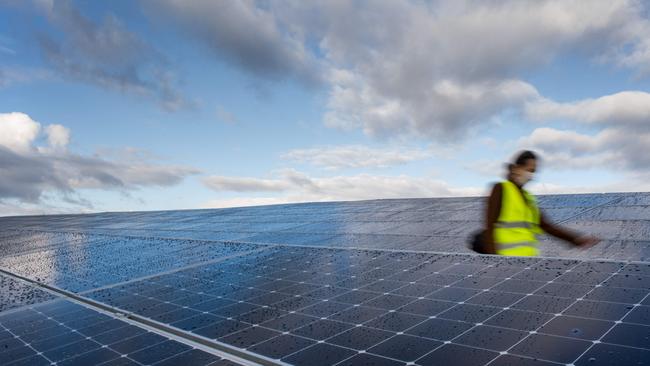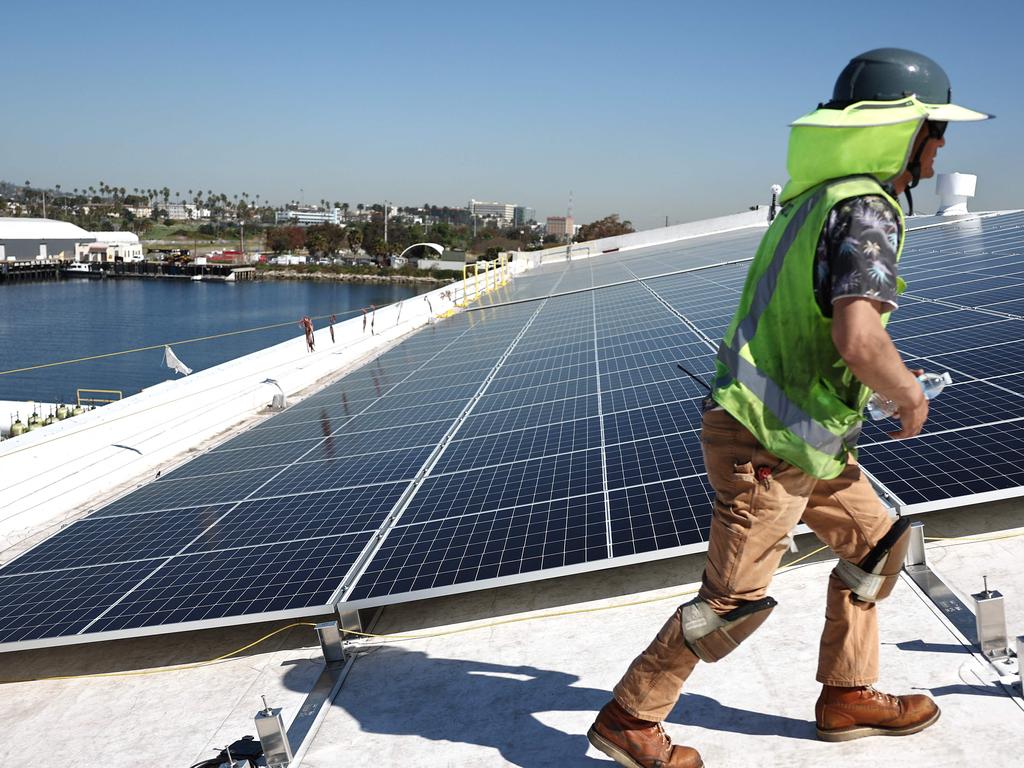Electricity prices to fall in boost to cost of living
After two years of power bill increases of more than 20 per cent, the energy regulator has proposed falls of up to 7 per cent for most households, though others will see small price rises.
Business
Don't miss out on the headlines from Business. Followed categories will be added to My News.
The majority of Australian households will see electricity bills fall from July 1 by as much as 7 per cent, the country’s energy regulator has proposed, a draft decision that will bolster hopes that a cost-of-living crisis that has left many buckling is waning.
Business bills could fall even more, with the regulator proposing falls of between 0.3 and 9.7 per cent – a draft ruling that is likely to be seized on by the Albanese government as inflation falls to an annual pace of 3.4 per cent.
The falls – albeit some in Queensland and regional NSW will actually see increases of as much as 2.7 per cent – are much larger than many had expected – and it will be welcomed by the federal government and the Reserve Bank, which has increased interest rates rapidly in a bid to rein in inflation, of which energy bills have been a major driver.
However, retailers are likely to experience a further squeeze on their margins.
Australians have endured two years of price increases of more than 20 per cent amid a global energy crunch, which have fuelled inflation, which has forced the RBA to lift interest rates at a record pace.
In a boost to household budgets, the Australian Energy Regulator on Tuesday proposed the default market tariff fall for the majority of households by between 0.4 per cent and 7.1 per cent from July 1, depending on where they live. The biggest falls will be seen across parts of NSW.
A draft ruling from Victoria’s Essential Services Commission has proposed prices in Australia’s second-largest state fall by just over 6 per cent.
However, the AER said other households will see price increases of between 0.9 per cent and 2.7 per cent. Those experiencing the biggest price surges will be households in parts of Queensland.
AER chair Claire Savage said the differential was due to varying costs across transmission companies, but every effort had been made to cut as much as possible.
“While wholesale markets have stabilised since their extreme peaks of 2022, this easing has been offset by the pressures we are observing in network prices. Poles and wires costs are a large component of retail prices, comprising around 40 per cent of the price,” she said.
Ms Savage said that while Queensland bills were rising nearly 3 per cent, households in Australia’s third most populous state have had the lowest in the country and would remain so.
The default market offer is a maximum price that retailers are allowed to charge, though they typically offer discounts against to entice new customers.
But retailers have long complained that the default market offer has not risen in line with their costs, and so fewer and fewer discounts are being offered as companies move to recoup recent losses.
The default market offer is calculated annually, with the AER considering the wholesale cost of electricity, the toll of transporting electricity and the cost of compliance with government rules and regulations.
With wholesale electricity prices – the cost of producing power – and the largest component of the default market offer – rapidly falling – there had been hopes of an instant relief to households and businesses. But the AER has in recent months moved to temper expectations of substantial, insisting the fall in wholesale prices would take several years to be fully felt in the default market offer.

The substantial price falls for the bulk of Australia will cause some irritation within the country’s retail companies.
While there has been a public perception that the industry has been extremely profitable, companies have stressed they made losses of hundreds of millions before 2023 and profit margins have been squeezed.
RBC Capital Markets analyst Gordon Ramsay said the fall in the default market offer has cemented his view that earnings among Australia’s largest retailers will fall next year.
“We believe this allowance increase is not commensurate with the other cost increases we are seeing across both businesses from higher bad and doubtful debts, labour cost increases, higher marketing spend, and other retail transformation costs. We expect this to lead to a narrowing of the captured margin in the [2025 financial year], and we therefore forecast falling energy markets earnings for both Origin and AGL,” said Mr Ramsay.
Ms Savage said the proposed default market offer will allow the industry to make good returns, and the regulator said healthy competition in the industry would remain.
“We do want to make sure that there’s enough space for retailers to come into the market and compete. So we’ve worked that larger buffer out. But we do want to make sure that we’re not being too conservative on the margins that are allowed because it is important to us that we have a healthy competitive retail market because we think that’s in the long term interests of consumers,” she said.
The proposed default market offer will now be opened for consultation, though substantial changes are unlikely.
A fall in electricity prices will aid the fortunes of the Labor government, which has seen a slump in support amid a cost-of-living squeeze.
Labor won power on a platform that promised to drastically boost the amount of renewable generation that it said would reduce the average household bill by $275 a year. Labor has insisted its plan is working, but a global energy crunch has been responsible for bills rocketing.
With electricity bills still up as much as $850 for many households since the 2022 election, Energy Minister Chris Bowen was muted in the declaration of victory.
“Now there’s a long, long way to go, but this is encouraging,” Mr Bowen said.
“There are real cost-of-living pressures around the world and in Australia, and energy prices are of course part of that and will continue to be.”
Originally published as Electricity prices to fall in boost to cost of living




